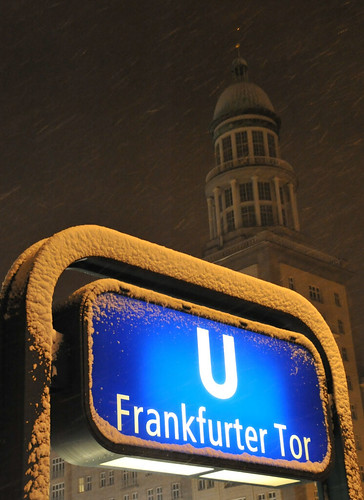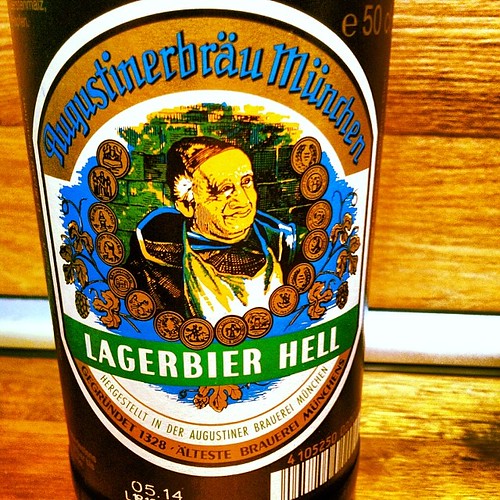16 English Words That Are Actually German (Part 2) Posted by Constanze on Mar 30, 2015 in Language
Here’s the second part of ’16 English words that are actually German’! Click here for the first 8 words.
Doppelgänger
Literal translation & German meaning: Double walker, or someone who looks identical to you
Meaning in English: Someone who looks exactly the same as you but is not related to you
Use in a sentence: I saw your doppelgänger in the street yesterday!
Extra fact: Like über becoming uber in English, doppelgänger becomes doppelganger in English due to the lack of umlauts in the English language
Frankfurter
Literal translation & German meaning: Of Frankfurt (the German city), referring to a type of hot dog sausage
Meaning in English: A thin, long hot dog sausage
Use in a sentence: I need to get some buns for our frankfurters
Extra fact: This sausage is called a Frankfurter because it was created in Frankfurt!

Frankfurter Tor U-Bahn: ‘Frankfurt Gate’ Underground Station. Photo by Cynthia (23896959@N04) on Flickr.com under CC BY-ND 2.0
Fussball
Literal translation & German meaning: Football
Meaning in English: A table football game played mostly in pubs
Use in a sentence: Fancy a game of fussball?
Extra fact: In Germany, table football has an English name: Kicker.
Poltergeist
Literal translation & German meaning: Noisy spirit (from poltern: to make noise, and Geist: spirit/ghost)
Meaning in English: Type of ghost, specifically one who moves and throws things
Use in a sentence: We think we’ve got a poltergeist in our house.
Neanderthal
Literal translation & German meaning: Neander valley (Thal = valley), primitive human species
Meaning in English: Primitive human species. It’s also used as an insult to describe a man who appears not to have evolved properly.
Use in a sentence: Look at Becky and her neanderthal of a boyfriend over there!
Extra fact: The Neander valley (Neanderthal) is a place in Germany. This is where the first remains of what we now know as the human neanderthal were found.
Lager
Literal translation & German meaning: Storehouse. Short for Lagerbier – storehouse beer.
Meaning in English: Type of beer
Use in a sentence: I’ll have a lager, please.
Extra fact: This word came to mean beer in English because it refers to a type of beer that is kept in a special storehouse for aging.
Wanderlust
Literal translation & German meaning: Wander desire (from wandern – to hike/trek, and Lust – desire/enthusiasm). In German use, the meaning of Wanderlust is quite true to its literal translation.
Meaning in English: A feeling that you’d like to travel and see new places
Use in a sentence: I’ve got real wanderlust after looking at your holiday pictures!
Delicatessen
Literal translation & German meaning: Delicate food/delicate eating, meaning fine foods
English meaning: Place to shop for fine foods (often shortened to deli)
Use in a sentence: I’ll get some meat from the deli
Extra fact: The word delicatessen has an anglicised spelling. In German it is spelt Delikatessen. The German word Delikatessen is also a loanword from the French délicatesse.
Did any of these words surprise you? How often do you use these words, or see them used in English?
Click here for Part 1!
Bis später,
Constanze x

Build vocabulary, practice pronunciation, and more with Transparent Language Online. Available anytime, anywhere, on any device.
About the Author: Constanze
Servus! I'm Constanze and I live in the UK. I'm half English and half German, and have been writing about German language and culture on this blog since 2014. I am also a fitness instructor & personal trainer.





Comments:
Phil Ramsden:
In British English, the game is called “table football”. We’re nothing if not literal-minded.
Brigitta Carter:
Pooh this second part had a few more surprises! Obviously know all theses words but had not thought about connecting it to German! Love this- thank you!
Constanze:
@Brigitta Carter Glad you liked it, Brigitta! The word ‘Lager’ surprised even me, I have to say!
alcazar:
Nice article as always.
“Lager” is also an anagram, read it backwards – it can be found in a Lager (the building) 😉
Delikat or Deli for a shop is also known, esp. here in former East-Germany (DDR). It was a higher-priced shop and also called “Fress-Ex” (sorry, no translation available).
Constanze:
@alcazar Thanks, alcazar! Fress-ex with ‘Fress’ coming from ‘fressen’, perhaps?!
alcazar:
Have asked for it.
In the former GDR there were those “Exquisit”-Shops where you could buy clothes (like a boutique). It was higher priced then the normal shops. Since the Delikat-Shops were build later, the familiar name “Fress-Ex” (for Fress-Exquisit) came up.
JoGoSt:
How about schwitzing from German “schwitzen” (= perspiring). Or schlepping from German “schleppen” (= carrying heavily)?
Constanze:
@JoGoSt Never heard of schwitzing, where is that used? Perhaps it’s not too common here in the UK! However, I have heard of ‘schlepping’! A very good addition to the list! 🙂
Eat Explore Etc:
I’ve also heard kaput (broken) and gesundheit (“bless you” alternative) used in England, though I was never sure if it was just my family being odd!
Constanze:
@Eat Explore Etc Yep, those are definitely on the list! 🙂